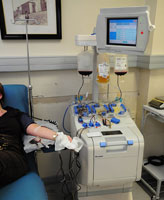
More than 3,000 Americans die every year waiting for a bone marrow donor match. Federal law has banned compensation to bone marrow donors since 1984, under the National Organ Transplant Act which likened bone marrow donation to organ donation. Yesterday, a federal appeals court in San Francisco ruled that the law no longer extends to bone marrow, declaring that marrow cells are "blood parts" and not "organ parts."
Back in the 80s extracting bone marrow was risky for the donor. But in the last 20 years, the process for obtaining marrow has become much safer and can be achieved through apheresis, a process similar to blood donation.
From The Los Angeles Times:
"This is a fundamental change to how deadly blood diseases will be treated in the country," said Jeff Rowes, the Institute for Justice attorney who argued the case before the 9th Circuit panel in February. "Compensation will expand the donor pool by at least hundreds and potentially thousands each year."
The lead plaintiff in the case is Doreen Flynn of Lewiston, Maine, a single mother of five trying to ensure that a broader field of potential donors is available when her three daughters suffering from Fanconi anemia need marrow transplants after treatment for the potentially fatal genetic disorder.
"That is, like, the best Christmas news ever!" said a jubilant Flynn upon hearing that the 9th Circuit had ruled to exclude marrow from the compensation ban. Her 13-year-old daughter is already on medication to stave off the need for a marrow transplant while waiting for a well matched donor, and Flynn must decide soon whether to put one of her 7-year-old twins on the same medication, she said.
MoreMarrowDonors.org wanted the organ transplant law struck down or amended to allow the nonprofit to offer $3,000 scholarships or housing payments to attract new registrants to the National Marrow Donor Program. The registry has more than 7 million members, but many joined years ago during donor drives for friends or family members and are often reluctant to donate to a stranger.